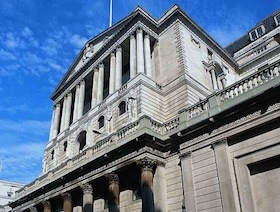The Bank of England maintained its base rate at 0.5% today - as expected - but the ECB unexpectedly cut its rate from 0.5% to 0.25% to try to bolster the Eurozone economy.
The Bank of England's Monetary Policy Committee also voted to maintain the stock of asset purchases financed by the issuance of central bank reserves at £375 billion. The Bank said the Committee reached its decisions in the context of the monetary policy guidance announced alongside the publication of the August 2013 Inflation Report.
The Committee's latest economic projections will appear in the forthcoming Inflation Report to be published at 10.30am on Wednesday 13 November and the minutes of the meeting will be published at 9.30am on Wednesday 20 November. The Bank of England reduced its Bank Rate by 0.5 percentage points to 0.5% on 5 March 2009 and it has remained unchanged since.
{desktop}{/desktop}{mobile}{/mobile}
The announcement means that the base rate has been unchanged for over 4.5 years. Economists have forecast that this means the it could be 2016 before the Bank of England base rate is increased. However, there may be pressure on the Bank to fall in line with the ECB and bring its rate down to 0.25% before then.
In a surprise move today, the European Central Bank (ECB) reduced its benchmark interest rate to a record low of 0.25% from 0.5%.
Mario Draghi, ECB president, said that the move was made because of a continuing likelihood of low inflation in the Eurozone and because of economic weakness in the Eurozone. Inflation in the Eurozone dropped to 0.7% in October, the lowest level since January 2010, causing deflation fears in some countries.
Reaction among UK economic experts to the ECB cut was mixed but mostly negative, saying it was "too little, too late."
Luke Bartholomew, investment analyst at Aberdeen Asset Management, said: "With inflation falling and the euro appreciating significantly recently, it makes economic sense for the ECB to cut rates. It is only a surprise to the market because the ECB has been so slow to react in the past. But Draghi knows that the spectre of deflation is stalking the Eurozone and wants to be seen to be taking action. The rate cut is a strong signal that the ECB will do everything it can to fight deflation and take the action that economic recovery requires."
Neil Williams, chief economist, Hermes Fund Managers, said the ECB move was "too little, and far too late!"
He said: "The Eurozone may be pausing from its 15 month recession, but there are reasons to be cautious still on the macro outlook. Admittedly, Q2's 0.3%qoq lift from technical, GDP recession - the first rise since summer 2011- suggested the worst may be over, with encouragingly the 'core two', Germany and France showing their first in-tandem GDP rises for almost a year. A continuation of this would justify the past year's convergence of government bond spreads back toward pre-crisis levels, and allay our fears that the Eurozone crisis will enter its second, more critical phase where the macro strains of the periphery increasingly wear on the core countries trying to foot the bill. Yet, with financial markets overly sensitised to US stimulus withdrawal - and not the un-fixed euro - rather than a still-unfixed Eurozone, they are still worrying about the wrong thing.
"Draghi's pledge last year to "do whatever it takes" may continue to cap funding costs (a symptom), but will do little to address the underlying problem: disparate competitiveness across a monetary union with insufficient economic union. We doubt any sudden volte-face from Germany on fiscal/banking union. We are more concerned about Spain's dilemma: where fiscal inertia means funding strains; yet, approaching 60% male youth unemployment, any meaningful reform risks social unrest.
"Greece needs an extra €3-4bn, Cyprus' terms need reviewing, and Portugal needs to extend its existing bail-out beyond mid-2014, given poor growth and obstacles to market funding. So, restructuring risk is not yet removed - no matter how punctuated the recession, or how effective Germany's new coalition will be."
Azad Zangana, European ecomomist at Schroders, said: "The cut appears to be in reaction to the early estimate of annual inflation for October, which was much lower than expected at 0.7%. While leading indicators suggest the Eurozone economy is recovering, the ECB is clearly concerned about the recent strength of the Euro, and the way it has lowered import prices and local inflation.
"The problem of low inflation and higher loan interest rates to households and business is most acute in the crisis hit peripheral Eurozone member states. However, we doubt the latest rate cut will have any impact in lower loan interest rates in these countries, as those banks do not hold adequate capital to lend, regardless of the interest rate.
"The cut in interest rates is a clear signal to the market that the ECB would like a weaker Euro in order to better reflect the state of the overall Eurozone economy. However, with the current account surplus at a record high, you may see the Eurozone's export competitors crying foul play."
• Want to receive a free weekly summary of the best news stories from our website every Friday? Sign up on our home now - it takes just a few seconds.

